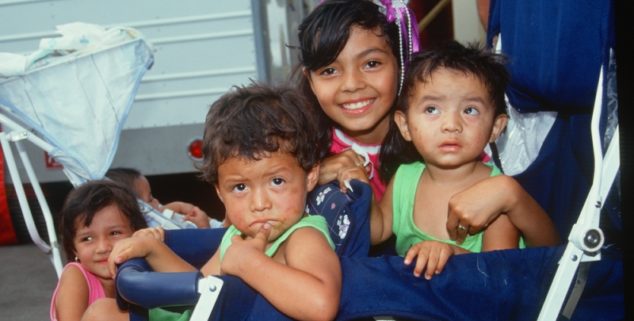Opinion
In California, a new war on poverty
 Children in a stroller in downtown Los Angeles. (Photo: Joseph Sohm, via Shutterstock)
Children in a stroller in downtown Los Angeles. (Photo: Joseph Sohm, via Shutterstock)It’s been a long time since the United States waged a “war on poverty.” But here in California, a new war is underway. Under the leadership of Gov. Gavin Newsom and the state Legislature, our recently enacted state budget confronts our poverty crisis with unprecedented investments in healthcare, preschool, CalWORKS, earned-income tax credits, and expanded juvenile justice and foster care funding and reforms.
Californians should be proud of these investments. But we must also recognize that they do little to help our state’s most vulnerable population – children living in deep poverty.
Nearly a half-million of the state’s children are in deep poverty, a number that would fill cities approximately the size of Long Beach, Oakland, Bakersfield, or Anaheim.
The good news is that our state’s policymakers now have an opportunity to end deep child poverty by implementing the Targeted Child Tax Credit proposed by the state’s Lifting Children and Families Out of Poverty Task Force.
For the sake of our state’s children, and in the interest of all taxpayers, we urge the governor and Legislature to enact the recommended Targeted Child Tax Credit. It’s an evidence-based solution to one of the state’s most costly problems.
The threshold for deep poverty varies with family size, the cost of living, and other factors.
As a benchmark, the deep poverty threshold for a single person with two children is, on average, about $13,400. Nearly a half-million of the state’s children are in deep poverty, a number that would fill cities approximately the size of Long Beach, Oakland, Bakersfield, or Anaheim.
This level of poverty means not having enough money to fix your car, losing your job because you can’t drive to work, and being evicted because one missed shift means you can’t pay the rent. It means living in and out of homelessness, moving constantly from school to school, and dealing with chronic health and behavioral problems that stress and chaos create. These children live, in effect, in an unrelenting emergency situation.
Unlike natural disasters, deep poverty is a preventable emergency, yet the state doesn’t treat it as such. Instead, the state is in perpetual crisis mode, spending billions of dollars on shelters, jails, emergency rooms, and foster care when it could ultimately reduce those expenditures – and much human suffering – by focusing on prevention. The smart move, in other words, is to keep people from getting sick, using emergency rooms, or becoming homeless in the first place.
When the Targeted Child Tax Credit is fully utilized, the deep poverty rate for children would drop to zero.
The TCTC is about making this smart move by building a new type of safety net for children. It recognizes that a 21st-century safety net should rest on two pillars – a pillar that rewards work and a pillar that treats children as sacred and deserving of protection. The TCTC completes that second pillar.
It extends the federal Child Tax Credit by supplementing a family’s income up to the amount needed to take children out of deep poverty. It supports the work pillar by allowing families in deep poverty to maintain a large share of their child credit even as they increase their earnings. As with the work-based Earned Income Tax Credit, it would be administered by the California Franchise Tax Board, thus capitalizing on the efficiency of using an existing delivery system.
When the Targeted Child Tax Credit is fully utilized, the deep poverty rate for children would drop to zero, and California would become the first state in the country to end deep child poverty. It’s that simple. And we can then start paring back on our “crisis management” approach that spends billions of dollars on problems better addressed at the source.
This is an extraordinary opportunity for a state that’s shown time and again that it’s willing to lead the way – on climate change, immigration reform, and so much more – by standing on principle.
The simple principle at stake here – one that we suspect most Californians take as self-evident – is that no child should live in abject poverty and that all children deserve an opportunity to thrive.
—
Editor’s Note: Conway Collis is co-chair of the state Lifting Children and Families Out of Poverty Task Force, and is president & CEO of the non-profit group GRACE, which leads the EndChildPovertyCA.org campaign. David B. Grusky, Ph.D., is the Edward Ames Edmonds Professor and Director, Center on Poverty and Inequality, at Stanford University. He is a researcher for the state Lifting Children and Families Out of Poverty Task Force.
Want to see more stories like this? Sign up for The Roundup, the free daily newsletter about California politics from the editors of Capitol Weekly. Stay up to date on the news you need to know.
Sign up below, then look for a confirmation email in your inbox.

Leave a Reply